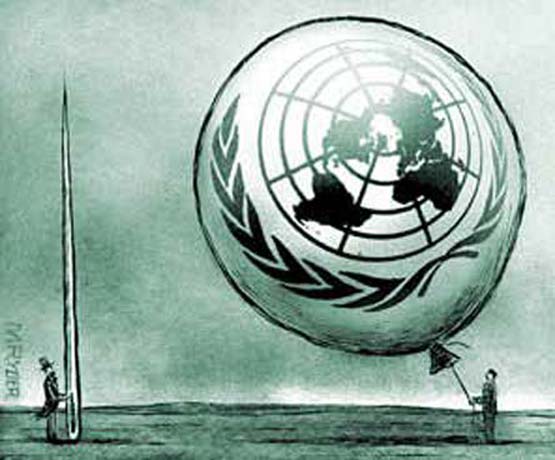
White House instructions to the State Department to look for cuts totaling more than a third of its budget include orders for what potentially are even higher reductions in U.S. payments to the United Nations.
U.S. officials cautioned that the outline of President Donald Trump's preliminary budget, to be released Thursday, is unlikely to reveal much in the way of intentions for specific programs. "We're early in the process with respect to budget numbers . . . it may look very differently a couple weeks or a couple of months down the road," acting State Department spokesman Mark Toner said Tuesday.
But the outline could provide an indication of how the administration plans to deal with an international institution that Trump during his campaign said caused more problems than it solved, and was "just a club for people to get together and talk and have a good time."
The United States spends about $10 billion a year on and through the United Nations, a combination of assessed payments that run the secretariat, peacekeeping operations and programs ranging from the International Atomic Energy Agency to the World Health Organization, and "voluntary" contributions that include what is by far the largest amount of assistance to global humanitarian aid programs.
Assessments are based on an agreed formula according to national wealth, under which the United States pays between 22 and 28 percent of total costs. Most, but not all, of the assessed and voluntary payments come from the State Department budget.
Threats to decrease or withhold U.N. payments have been common in the past, particularly in Republican administrations, and the United States has often found itself in arrears on assessed funding.
But the Trump administration appears more serious than most in its threats to make deeper and more permanent cuts in payments that would significantly affect U.N. operations. At the same time, it has warned that it may withdraw altogether from U.N. agencies it considers particularly counterproductive.
Chief among them is the U.N. Human Rights Council, a 47-member, Geneva-based agency whose rotating membership has included widely agreed rights violators such as China, Cuba and Saudi Arabia. Although President George W. Bush refused to join, President Barack Obama reasoned that it was better to be within the tent than outside.
The principal U.S. criticism of the UNHRC is that it has made Israel its favorite punching bag.
During Trump's first month in office, his administration considered vacating its seat at the council, but decided instead to simply warn it. In a letter to leading humanitarian nonprofits, first reported by Foreign Policy, Secretary of State Rex Tillerson said that "the Human Rights Council requires considerable reform in order for us to continue to participate."
Foreign Policy also reported Monday that the State Department had been instructed to seek cuts of more than 50 percent in funding for U.N. programs, although U.S. officials, speaking about budget plans on the condition of anonymity, said that number was above what is being sought.
In her January confirmation hearing, the U. S. ambassador to the United Nations, former South Carolina governor Nikki Haley, said she would not "shy away" from using U.S. funding as leverage to change the organization.
At the same time, however, she said that "I do not think we need to pull money from the U.N. We don't believe in slash-and-burn."
"I haven't had anyone talk to me about cutting off the aid," Haley told the Senate Foreign Relations Committee of her conversations with the administration. But "we need to look at each and every mission, see what we're doing and see how we can make it more effective for people in the area . . . As I've said, you can never win with slash-and-burn techniques. That doesn't work. What is important is that we do strategic types of cutting if we're going to cut anything at all."
But there is little doubt that the administration is looking to significantly reduce U.S. spending, even as it has said it intends to increase American clout at the United Nations.
Many in Congress have reacted negatively to reports that the administration is looking to cut the overall State Department budget - which accounts for less than 1 percent of the budget - by up to 37 percent.
Sen. Lindsey Graham, R-S.C., said such a proposal would be "dead on arrival" on Capitol Hill, and Majority Leader Mitch McConnell, R-Ky., said he was not in favor of such draconian cuts that "probably" couldn't pass in the Senate.
"The diplomatic portion of the federal budget is very important," McConnell told reporters last month.
But the United Nations traditionally has drawn less congressional support. Ire among lawmakers on both sides of the aisle remains particularly high over a U.S. abstention late last year under the Obama administration on a Security Council resolution criticizing Israeli settlements in West Bank territory.
"I think that after what they have done," Sen. John McCain, R-Ariz., said of the Israel vote, "there should be a reduction in funding. I'd like to see it specified on some aspects of the U.N., but certainly what they did in their vote in Israel is something - I don't think they deserve American tax dollars."
Graham agreed. While describing himself as an "internationalist," he said in an interview that he had "suggested we suspend the U.N. funding until they deal with the Israeli issue."


 Contact The Editor
Contact The Editor
 Articles By This Author
Articles By This Author